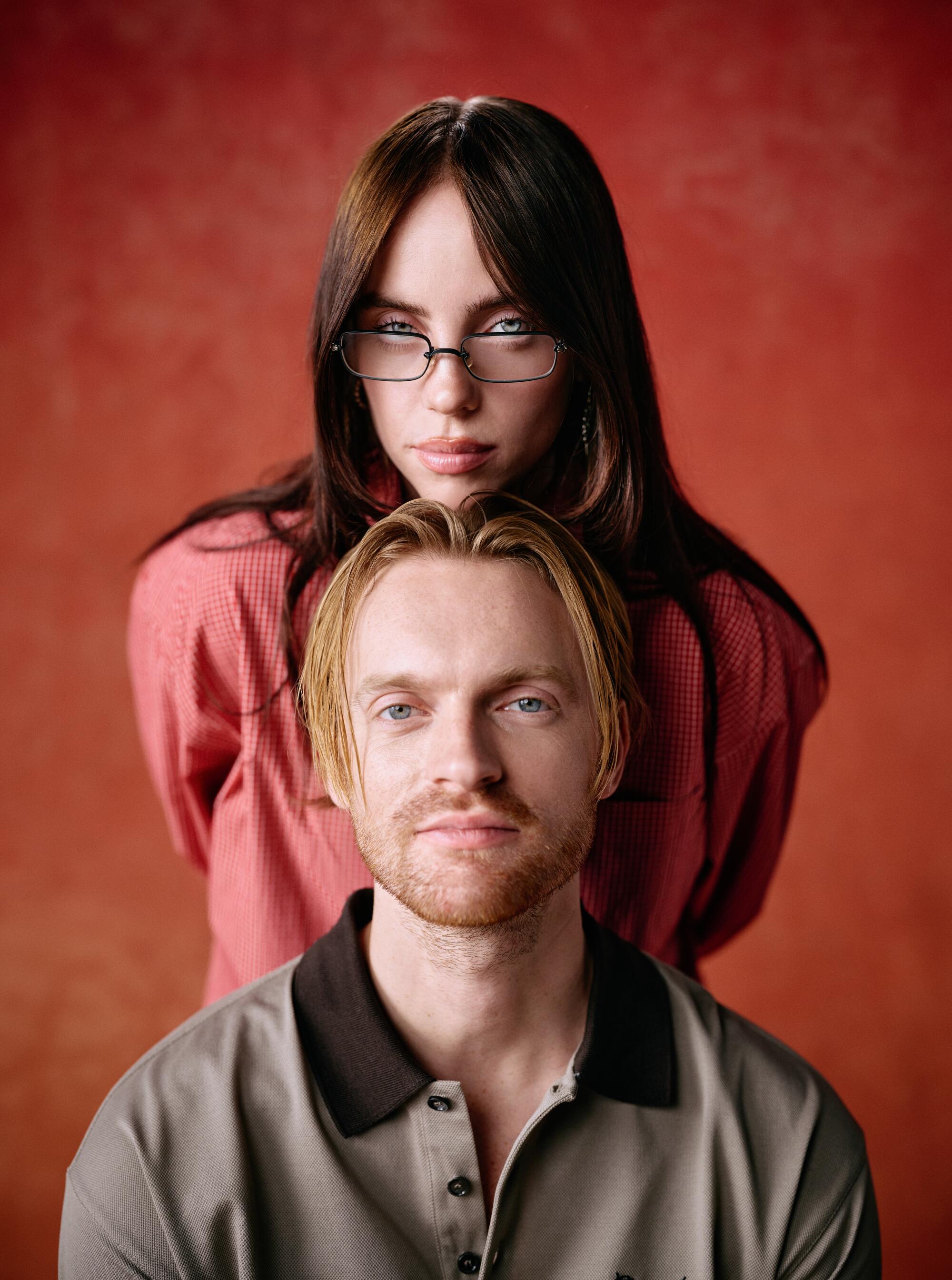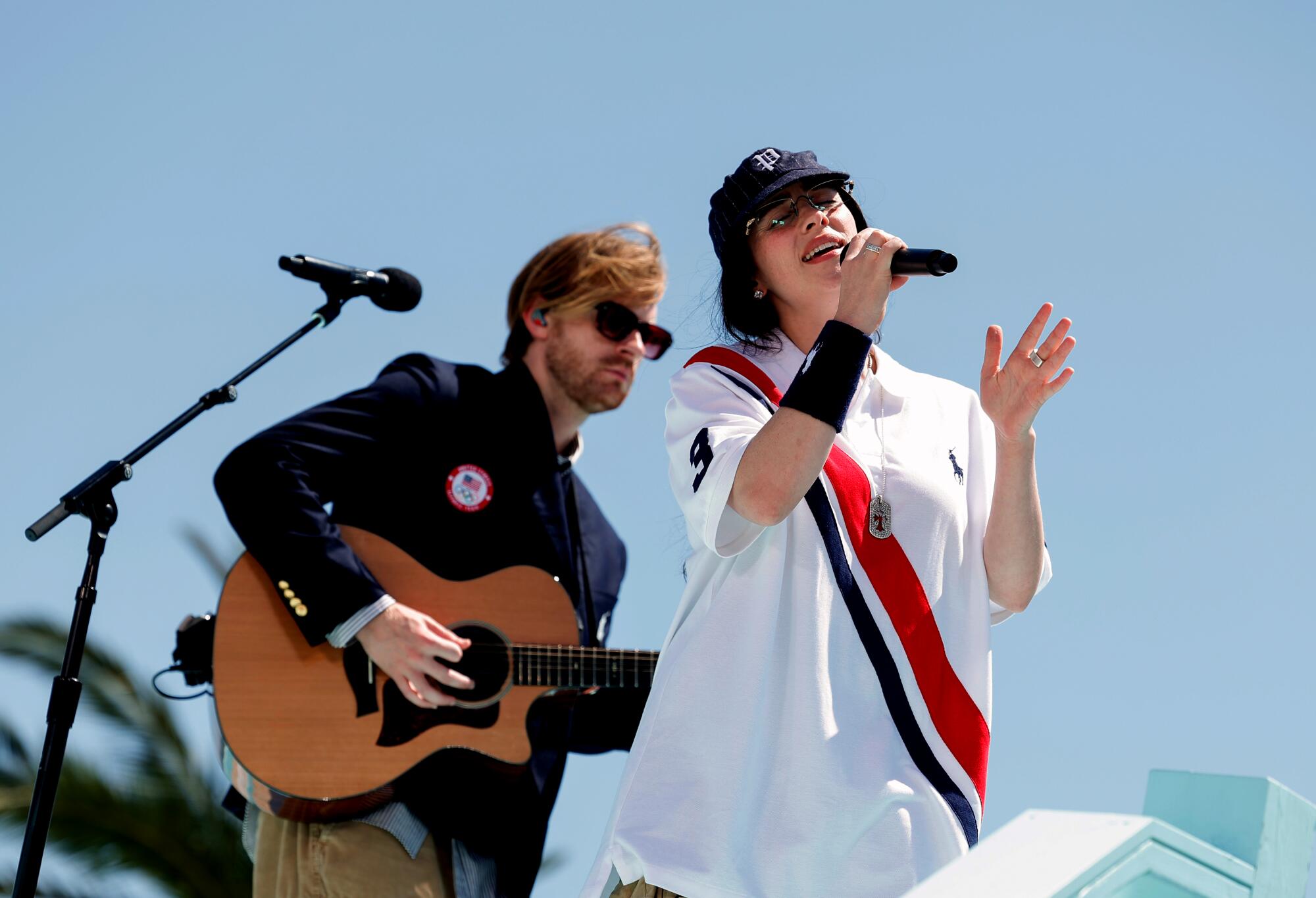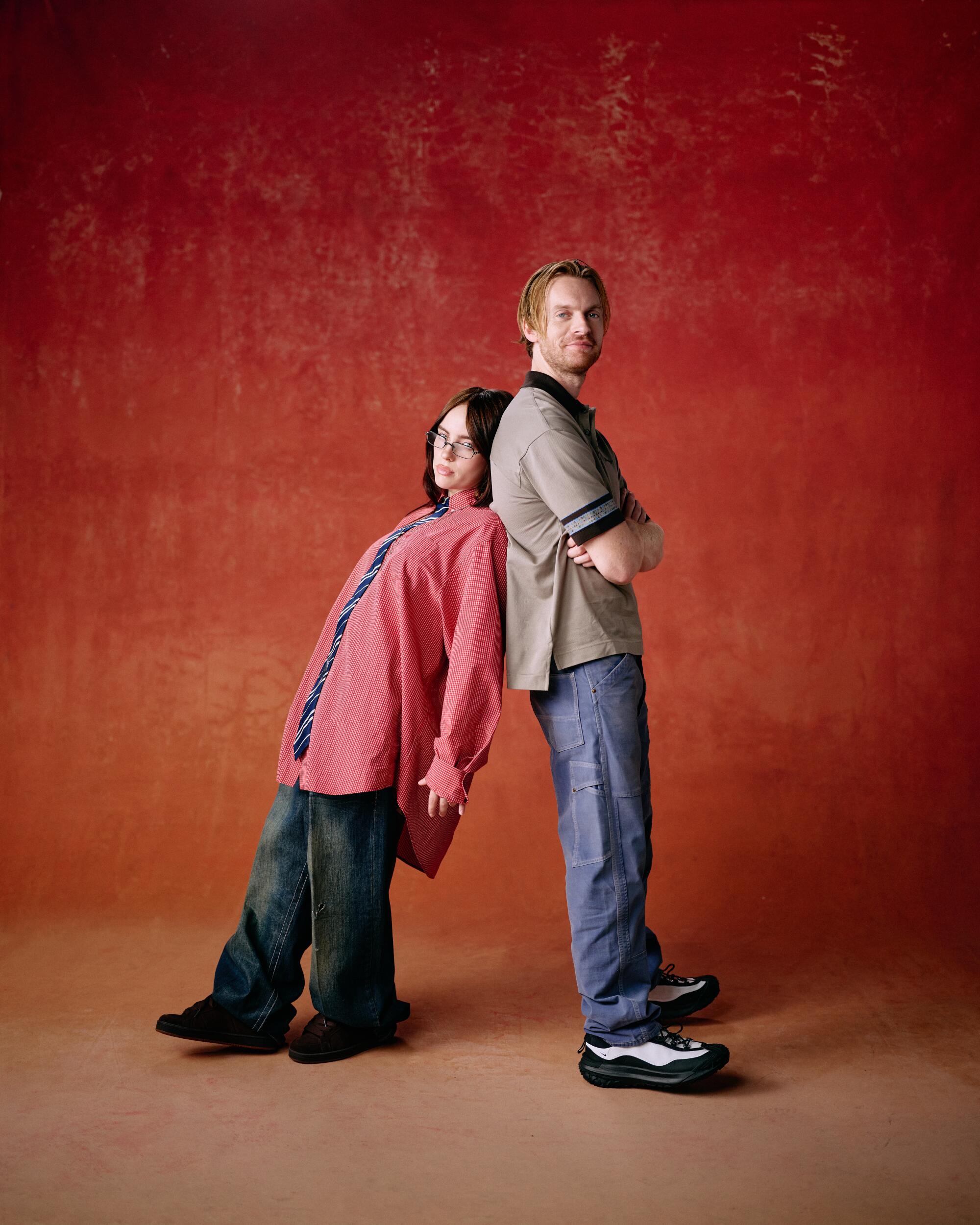
- Share via
Billie Eilish and her brother, Finneas, are sitting in a Glendale dressing room, moisturizing after a photo shoot as they laughingly recount the time their dad asked a young Finneas to climb on a chair and snap a picture of his bald spot.
“This was a brief moment when he was trying some sort of topical hair ointment,” Finneas says, “and so he was like, ‘Can you do this every day?’”
“I remember he wanted to track his progress,” Eilish adds. “All those hair-plug companies do that, where they have the photo of the bald spot, then six days later—”
“He didn’t get hair plugs, to be clear,” Finneas interrupts. “But I was small enough that taking those photos of his head seemed like a very important task.”
For these two pop savants, work and family have long been intertwined. The homeschooled siblings grew up singing in the Los Angeles Children’s Chorus — “Mrs. T, you didn’t like me, but you were good at your job,” Eilish said of the choir’s artistic director when she and Finneas won an Oscar for original song at March’s 96th Academy Awards — and they started recording their own songs when Eilish was just 13. At 17, she became a global superstar with the release of her quadruple-platinum 2019 debut, “When We All Fall Asleep, Where Do We Go?,” which the duo made at their parents’ house in Highland Park — Eilish singing, Finneas producing, both of them writing; two years later, they followed it up with “Happier Than Ever,” which debuted atop the Billboard 200.
Nominations for the 67th Grammy Awards will be announced on Nov. 8 with the ceremony itself taking place on Feb. 2.
The squirmy electro-goth sound they’ve developed together blends old-fashioned torch balladry with elements of hip-hop and folk music. And with it they’ve become a reliable joint presence — always cracking each other up with some inside joke — at any number of awards shows: Before that Oscar this year for their wistful “Barbie” weeper “What Was I Made For?” they won an Academy Award for their Bond theme “No Time to Die” and no fewer than nine Grammys, including one for album of the year, two for record of the year and two for song of the year. (Nobody in Grammys history has won song of the year three times.)
Says Bernie Taupin, who knows something about enduring musical duos: “They’re a match made in heaven.” The lyricist renowned for his long partnership with Elton John admires the siblings’ “winning combination of originality and classic songwriting” and says they’ve left “undeniably unique fingerprints on their own generation.”
Now they’re in the running for a boatload of nominations at February’s 67th Grammys with their third album, “Hit Me Hard and Soft,” which came out in May to rave reviews and the best first-week sales numbers of Eilish’s career. Written, as always, by the siblings and produced, as always, by Finneas, the 10-track LP finds the 22-year-old singer confronting the alienating effects of pop stardom — not least the unwelcome scrutiny of her body — even as it documents an awakening of queer sexual desire she narrates with piercing wit and candor, as in the swaggering “Lunch”: “I could eat that girl for lunch / Yeah, she dances on my tongue / Tastes like she might be the one.”

“Billie knows herself — that’s rare,” says Charli XCX, who invited Eilish to appear on a remix of her song “Guess” that went immediately viral amid the so-called Brat summer inspired by the English singer’s latest album. “The music we make is very different, but I think we approach writing in a really similar way in that there’s a level of honesty and directness,” Charli adds. “She’s only doing something if she truly feels it. I respect that, and that’s a hard quality to hold onto when you’re being pulled in a million different directions.”
Eilish and Finneas, 27, use that sense of determination to try new things on “Hit Me Hard and Soft,” most readily perhaps in “Birds of a Feather,” which might be the first song they’ve created that could be described as a breezy summertime bop.
“I had moments of thinking, ‘Oh, my God, ‘Birds of a Feather’ is our worst song,’” Eilish says, her legs pulled up beneath her on a sofa in the dressing room. She’s wearing an oversize salmon-colored dress shirt and extra-baggy jeans; Finneas, in a two-tone polo, has his feet propped on a coffee table. “I thought it was too poppy and that everyone was gonna hate it,” she adds. In reality, the song exploded, racking up more than 1.1 billion streams on Spotify and topping Billboard’s pop radio chart.
“Birds’” sunny vibe contrasts with a pretty grim lyric: “I want you to stay / Till I’m in the grave / Till I rot away, dead and buried / Till I’m in the casket you carry.”
“But that’s what makes the sentiment interesting, right?” Finneas asks.
“I remember the night we wrote it, we played it for our parents,” Eilish says. “They were like, ‘“ Till I rot away, dead and buried?”’ She laughs. “It’s dark s—.”
“And you’re singing it in the most airy, joyous tone,” Finneas adds.

Indeed, “Birds of a Feather” shows off a gripping new facet of Eilish’s voice, which historically has tended toward the soft and whispery. Here, though, she works herself up to a full-on belt in a way we’ve never heard from her before — in part, she says, because she “wasn’t physically able to do that until like two years ago.”
Who’s in her pantheon of belters? “Matt Bellamy in ‘Madness,’” she replies, referring to the Muse frontman. “Parachute, ‘What I Know.’ Avril Lavigne on the bridge of ‘I’m With You.’” A few months ago, the siblings spent an evening at Finneas’ place watching Lavigne’s old music videos, which led Eilish to realize how much she’s pulled from the pop-punk star.
“I was like, ‘This is so me,’” she says. “She was one of the first women who was dressing kind of like a boy, and I was so drawn to that. She’s the coolest.”
Eilish and Finneas similarly play with the tension between light and dark in “The Diner,” which channels the disturbing thoughts of a stalker against a jaunty arrangement reminiscent of Eilish’s beloved Gorillaz.
“You think it’s jaunty?” Eilish asks in disbelief.
“I think it’s spooky,” Finneas says.
“It’s creepy to me,” Eilish adds. “Now that I’m thinking about it, though, there is kind of a circus-y element to it that feels a little clown-show-y in a cool way. It’s the same principle as ‘Birds of a Feather,’” she continues. “Taking yourself super seriously can be unrewarding for an audience member. There are albums that are really painful and worth listening to in a cathartic way, but they’re not things I put on regularly.
“For instance, ‘What Was I Made For?’ is bleak, and I don’t really want to listen to it because of that, even though it’s one of my favorite songs we’ve ever made. I mean, I love it, but I’m not gonna get in the car and put that on.”
“‘What Was I Made For?’ at a bar would be crazy,” Finneas agrees with a laugh.
What made Eilish want to write about a stalker?
“Who knows?” she says. “It’s up for interpretation, I guess. That’s definitely the song on the album where I’m like, ‘Y’all can figure that one out — I’m not gonna get into it.’”

Eilish’s thinking about fame has changed over the five years since 2019, when Finneas can vividly recall a TSA agent taking photos of his sister in an airport.
“You can’t say, ‘Don’t take a photo of me’ to TSA,” he says. “They’d be like, ‘Come into this room.’ They’re in charge.”
“It’s such a power imbalance,” Eilish adds. “But also these are the people who are supposed to keep you safe.”
Finneas remembers telling the TSA story to singer John Mayer, who tried to assure him that he and Eilish were “fresh out of the furnace” and that the situation would cool down sooner or later. Eilish didn’t believe it at the time: “I thought, this is just how my life is gonna be. I’ll never get to go outside again, and I’ll never feel like a person ever again. Every room is gonna be, ‘It’s Billie Eilish!’ and that’s gonna make me eventually kill myself.” She rubs one of her necklaces between her fingers.
Finneas: “Fame feels like a face tattoo.”
Eilish: “You can put makeup on it. Not right away because it’s healing — you can’t take a shower, you can’t go swimming, you can’t work out.”
Finneas: “But eventually it fades.”
Eilish is dubious about the current discourse that says fans have lost any sense of boundaries in regards to pop stars. “It’s been lost,” she says.
Finneas: “You look back at the Beatles, and it’s the same thing. It’s just that everybody has a camera now.”
Eilish: “You have to remember when you’re everybody’s new favorite artist that it’s a big deal for them. It’s like seeing Bigfoot.”
Finneas: “And they’re not intimidated by you when you’re brand-new. I remember Billie and I being at our second Grammys and 叠别测辞苍肠é talking to us for the first time. This was 2021, and she’d had such a legendary run that it was like meeting royalty. I couldn’t believe we were talking to 叠别测辞苍肠é. But if I see somebody that’s just started out, where I haven’t had time to get intimidated by them, I might be much more likely to walk over and be like, ‘I know who you are.’”
Surely, the siblings have heard Chappell Roan’s much-discussed statements on this topic?
“It’s hard out here, man — it’s hard,” Eilish says. “But there’s ways of…” She trails off, then starts again. “It would…” Again. “Whatever.”

Speaking to The Times last year, as she and Finneas finished “Hit Me Hard and Soft,” Eilish noted that the album would be the first one she’d release as an adult. So how did that end up feeling?
“I’m finding I’m having kind of a hard, weird time being in my 20s,” she says. “I just didn’t ever think about how I wouldn’t be the youngest person in the room forever. At the same time, fame really stunts you. So I find myself acting like a kid sometimes because I’m like, ‘Yeah, I got frozen in time.’ When I see other pop stars, I see that they’re still 16 a little bit. It’s kind of depressing.”
Does Finneas see a difference between 16-year-old and 22-year-old Billie?
“Immense,” he says. “I disagree with the sentiment in many ways. I think Billie is a completely different person now.”
“I’m a different person — I just didn’t really grow,” Eilish says. “I didn’t really become an adult.”
“I think how you feel you are is different than how you behave,” Finneas replies. “I feel like you behave like an adult now.”
“Well, that’s good,” Eilish says with a shrug.
She certainly sings like an adult on “Hit Me Hard and Soft.” “I’ve never heard her voice sound like it does in ‘The Greatest,’” says her friend Alex Wolff, the former child actor from Nickelodeon’s “The Naked Brothers Band” whose duo with his brother Nat serves as the opening act on Eilish’s current arena tour. “That singing could only come from somebody who’s lived, who’s had some life experiences, who’s had some ups and downs.”
John Janick, chairman and chief executive of Eilish’s record company, Interscope Capitol Labels Group, says, “Billie is an old soul,” which points up a funny fact: In a year crowded with breakout pop acts — Roan, Charli XCX, Sabrina Carpenter — Eilish at 22 suddenly resembles a veteran. Did she ever feel threatened by the new stars’ success? “Are you kidding me?” she asks. “I’m so happy for these bitches. It’s a crazy world when you get to the level they’re experiencing right now, and they’re doing great. Fans are drawn to them because they’re f—ing awesome.”
Eilish’s tour, which will stop for five nights at Inglewood’s Kia Forum in December, marks the first time she’s gone on the road without Finneas, who’s spending the fall touring behind a solo record of his own. (Finneas plans to appear with his sister onstage as his schedule permits.) Asked if any conclusions should be drawn from that about the state of their union, Eilish says, “It’s really not the end of anything. You can’t be in two places at once.”
When the siblings began work on “Hit Me Hard and Soft,” they thought maybe “this would be the one where we have a bunch of friends come in,” Finneas says. “Third album, you know, it’s like, How do you reinspire yourself? How do you reinvent the wheel? How do you keep it fresh? But it just didn’t end up shaking out that way.”
“Instead,” Eilish says, “we made the most autobiographical album we’ve ever made.”
More to Read
The biggest entertainment stories
Get our big stories about Hollywood, film, television, music, arts, culture and more right in your inbox as soon as they publish.
You may occasionally receive promotional content from the Los Angeles Times.












